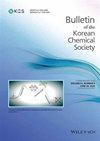Design principles of protein–protein interfaces
IF 2.2
4区 化学
引用次数: 0
Abstract
We investigated the energy landscape of protein–protein complexes using a customizable energy model. Our findings highlight the crucial role of contact differences in distinguishing between authentic proteins and decoys, emphasizing the importance of accurately capturing favorable contacts. These insights contribute to the development of computational models for protein–protein interactions.

蛋白质-蛋白质界面的设计原则
我们使用可定制的能量模型研究了蛋白质-蛋白质复合物的能量景观。我们的研究结果强调了接触差异在区分真实蛋白质和诱饵方面的关键作用,强调了准确捕获有利接触的重要性。这些见解有助于开发蛋白质-蛋白质相互作用的计算模型。
本文章由计算机程序翻译,如有差异,请以英文原文为准。
求助全文
约1分钟内获得全文
求助全文
来源期刊

Bulletin of the Korean Chemical Society
Chemistry-General Chemistry
自引率
23.50%
发文量
182
期刊介绍:
The Bulletin of the Korean Chemical Society is an official research journal of the Korean Chemical Society. It was founded in 1980 and reaches out to the chemical community worldwide. It is strictly peer-reviewed and welcomes Accounts, Communications, Articles, and Notes written in English. The scope of the journal covers all major areas of chemistry: analytical chemistry, electrochemistry, industrial chemistry, inorganic chemistry, life-science chemistry, macromolecular chemistry, organic synthesis, non-synthetic organic chemistry, physical chemistry, and materials chemistry.
 求助内容:
求助内容: 应助结果提醒方式:
应助结果提醒方式:


